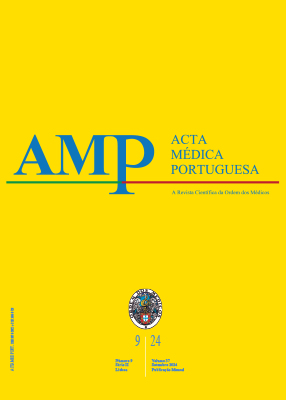Strongyloides stercoralis in Low-Income Immigrants from Portuguese Speaking African Countries in Lisbon, Portugal
DOI:
https://doi.org/10.20344/amp.21782Keywords:
Africa, Emigrants and Immigrants, Portugal/epidemiology, Strongyloides stercoralis, Strongyloidiasis/diagnosis, Strongyloidiasis/epidemiologyAbstract
N/a.
Downloads
References
Buonfrate D, Bisanzio D, Giorli G, Odermatt P, Fürst T, Greenaway C, et al. The global prevalence of strongyloides stercoralis infection. Pathog. 2020;9:1-9. DOI: https://doi.org/10.3390/pathogens9060468
Sanpool O, Intapan PM, Rodpai R, Laoraksawong P, Sadaow L, Tourtip S, et al. Dogs are reservoir hosts for possible transmission of human strongyloidiasis in Thailand: molecular identification and genetic diversity of causative parasite species. J Helminthol. 2019;94:e110. DOI: https://doi.org/10.1017/S0022149X1900107X
Abad CL, Bhaimia E, Schuetz AN, Razonable RR. A comprehensive review of Strongyloides stercoralis infection after solid organ and hematopoietic stem cell transplantation. Clin Transplant. 2022;36:e14795. DOI: https://doi.org/10.1111/ctr.14795
World Health Organisation. Basic laboratory methods in medical parasitology. Geneva: World Health Organization; 1991.
Sanprasert V, Kerdkaew R, Srirungruang S, Charuchaibovorn S, Phadungsaksawasdi K, Nuchprayoon S. Development of conventional multiplex PCR: a rapid technique for simultaneous detection of soiltransmitted helminths. Pathog. 2019;8:152. DOI: https://doi.org/10.3390/pathogens8030152
Agbata EN, Morton RL, Bisoffi Z, Bottieau E, Greenaway C, Biggs BA, et al. Effectiveness of screening and treatment approaches for schistosomiasis and strongyloidiasis in newly-arrived migrants from endemic countries in the EU/EEA: a systematic review. Int J Environ Res Public Health. 2018;16:11. DOI: https://doi.org/10.3390/ijerph16010011
Downloads
Published
How to Cite
Issue
Section
License
Copyright (c) 2024 Acta Médica Portuguesa

This work is licensed under a Creative Commons Attribution-NonCommercial 4.0 International License.
All the articles published in the AMP are open access and comply with the requirements of funding agencies or academic institutions. The AMP is governed by the terms of the Creative Commons ‘Attribution – Non-Commercial Use - (CC-BY-NC)’ license, regarding the use by third parties.
It is the author’s responsibility to obtain approval for the reproduction of figures, tables, etc. from other publications.
Upon acceptance of an article for publication, the authors will be asked to complete the ICMJE “Copyright Liability and Copyright Sharing Statement “(http://www.actamedicaportuguesa.com/info/AMP-NormasPublicacao.pdf) and the “Declaration of Potential Conflicts of Interest” (http:// www.icmje.org/conflicts-of-interest). An e-mail will be sent to the corresponding author to acknowledge receipt of the manuscript.
After publication, the authors are authorised to make their articles available in repositories of their institutions of origin, as long as they always mention where they were published and according to the Creative Commons license.









